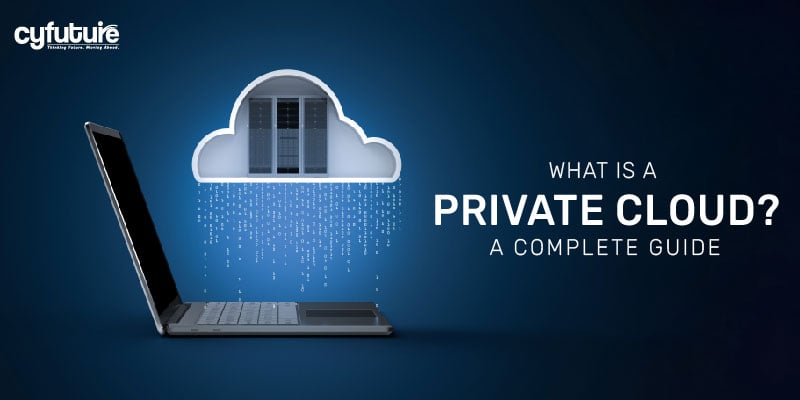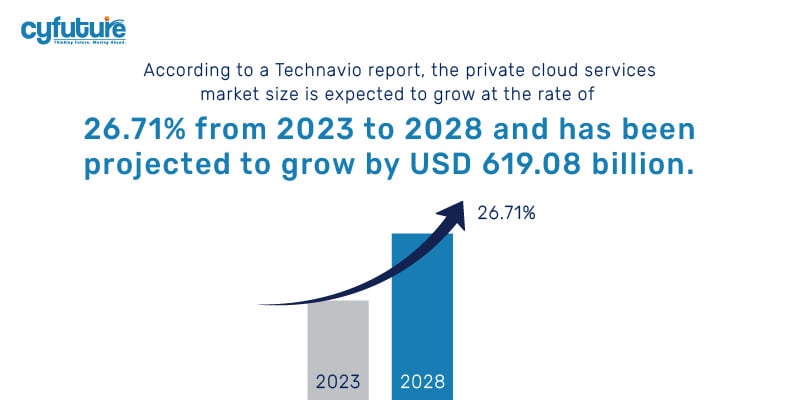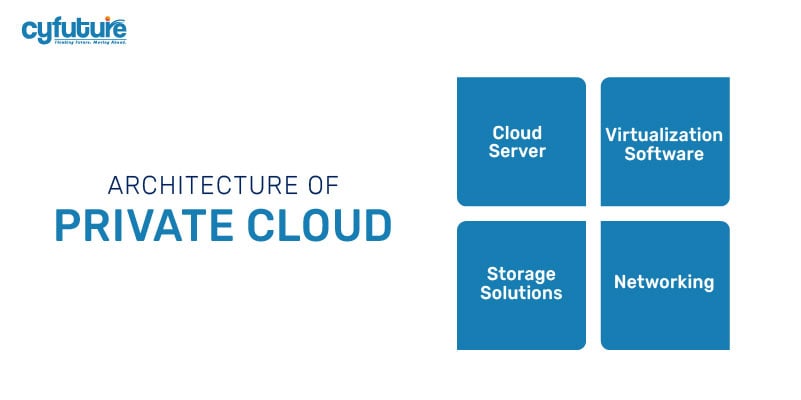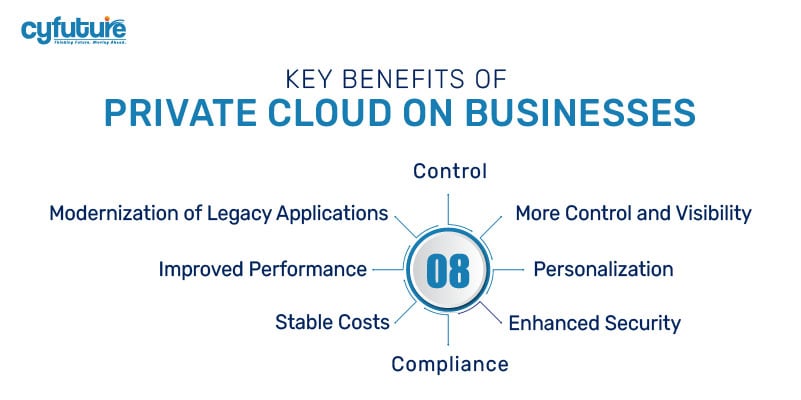-
Get Cloud GPU Server - Register Now!
Toggle navigation

For organizations looking to stay ahead of the competition, when data is king, knowing the basics of cloud computing has become essential. Of these ideas, the private cloud is particularly noteworthy for its security, control, and personalization.
Increasingly popular among organizations, private cloud is mainly adopted to add greater data security. Following industries like education, retail, and government, organizations are opting for private cloud settings wherein to conduct their business use cases involving sensitive information workloads and to meet data privacy and compliance demands.

A hybrid approach—an integration of on-premises, private cloud, and public cloud into a single, flexible IT infrastructure—is also strongly associated with the demand for private cloud settings, which is regarded as a critical element of the enterprise-business digital transformation journey.
As the IBM Transformation Index: State of Cloud report outlined, 71% of surveyed business executives concur that difficult it is to realize the benefits of a digital transformation without a solid hybrid cloud strategy in place.
In this comprehensive blog post, we will examine the concept of a private cloud, as well as its key features, benefits, and alternatives to conventional cloud deployment strategies. Additionally, we will also discuss the role of a cloud server in ensuring the security and functionality of your private cloud, as well as the importance of cloud security services.
Private clouds are a subset of cloud computing infrastructure that is only used by one company, guaranteeing that all resources, including storage, processing power, and network capabilities, are utilized by that organization alone. In contrast to a public cloud, which allows several tenants to share resources, a private cloud provides more privacy, control, and customization choices. It may be hosted by a third-party service provider or on-site.
Private clouds are perfect for sectors like government, healthcare, and finance since they are frequently used by businesses that need to adhere to strict regulations and secure sensitive data. A private cloud lowers the risks associated with multi-tenant environments by providing a single-tenant environment that guarantees data and apps stay inside the organization’s boundaries.
Four primary types of private clouds to choose from:
An on-premises private cloud is hosted in a company’s on-site data center and is overseen by its IT department. When using an on-premises private cloud, a company purchases and manages all of the necessary hardware, software, security measures, and other infrastructure.
A VPC is a separate private cloud environment inside a public cloud. With this safe environment, VPCs let an organization run programs, host webpages, and carry out other tasks on shared CSP resources.
A hosted private cloud is run on a CSP’s servers off-premises. It is different from VPC in that it is an environment with dedicated servers, also called bare metal servers, rented by a single organization. In the hosted private cloud, the resources such as maintenance, upgrades, and security management tools for cloud storage are owned and managed by the cloud provider.
A managed private cloud refers to physical hardware hosted usually in a service provider’s data center. However, CSPs provide management services for private cloud infrastructure hosted in an enterprise’s data center. Here, the CSP performs maintenance, upgrades, support, and management.

The architecture of a private cloud consists of multiple elements that work together and provide a secure, scalable, and reliable application platform and data store. Many of these typically include:
The core of a cloud infrastructure is the cloud server, responsible for computing resources, processing power, and storage. Within a private cloud, this server is usually dedicated to a singular organization to optimize its performance and security. These servers may be virtualized or run on dedicated physical hardware, depending upon the requirements of the organization.
Virtualization software enables the hosting of multiple virtual machines on one physical server, thus better utilizing and improving the scalability of resources. With private cloud services, companies can make use of virtualization for isolating their workloads, running legacy applications, and scaling resources dynamically according to demands.
The storage structure used within a private cloud may differ from the direct-attached storage, NAS, and storage area networks SANs, depending on the preferences of the organizations. Private cloud storage maintains security for sensitive business data while making them easily accessible and highly available.
The private cloud is dependent on a secure, high-speed network that interconnects all resources within the environment. Dedicated networks such as Virtual Private Network (VPN) or Direct Connect provide secure communication channels between internal data centers and cloud resources.
| Aspects | Private Cloud | Public Cloud | Hybrid Cloud |
| Deployment Model | Dedicated infrastructure for a single organization. | Shared infrastructure among multiple organizations. | Combination of both private and public cloud. |
| Security | High security with customizable measures; ideal for sensitive data. | Standard security measures; might not meet regulatory needs. | Balancing security with flexibility; sensitive data in the private cloud. |
| Control | Full control over resources and customization. | Limited control, managed by the provider. | Control over private cloud resources; flexibility with public cloud. |
| Scalability | Limited by physical infrastructure; scaling is costlier and slower. | High scalability; can scale up or down quickly as per demand. | Scalable, utilizing both private and public clouds as needed. |
| Cost | Higher initial cost due to dedicated infrastructure and maintenance. | Lower cost due to shared resources, and pay-per-use pricing. | Medium cost; you pay for private cloud for sensitive workloads, public for others. |
| Compliance and Regulations | Ideal for industries with strict regulatory requirements (e.g., finance, healthcare). | Not always suitable for compliance-heavy industries. | Meets regulatory needs by keeping sensitive workloads in the private cloud. |
| Performance | Optimal performance due to dedicated resources. | Variable performance due to resource sharing. | Can optimize performance by using private cloud for critical apps, and public cloud for others. |
| Flexibility | Less flexible due to fixed infrastructure. | Highly flexible, resources can be adjusted easily. | Offers flexibility with the ability to use both private and public clouds. |
| Use Case | Best for businesses with strict security, compliance, and customization needs. | Best for businesses that need quick deployment, cost-efficiency, and scalability. | Suitable for businesses needing a balance of security and flexibility. |
| Maintenance | Requires internal resources for maintenance and updates. | Provider-managed maintenance and updates. | Shared responsibility; private cloud requires internal maintenance, public cloud is managed by the provider. |

A private cloud offers a few tremendous advantages to organizations. Some of the top ones are the following:
A private cloud would give an organization complete control over its environment, including choices with regard to hardware, software apps, and different levels of security, while also affording a number of benefits of cloud computing, including on-demand access to cloud resources, elasticity, scalability, and ease of service delivery.
Private clouds enable organizations to have more control and sight behind private firewalls to store their data and workloads.
Private clouds enable customizing hardware and software according to business needs. For example, IT teams can tailor specific needs for data storage and backup, thus improving overall efficiency and cost-effectiveness.
In general, private clouds are designed with more layers of security than public clouds. For example, companies in such sectors as government and finance are desperately seeking private clouds that may safeguard extremely sensitive data such as personally identifiable information (PII) from a user or some bad actor who can steal it.
Private cloud security encompasses firewall configurations, virtual private networks (VPNs), data encryption, authorization mechanisms, and even more so as a means to minimize breaches or cyberattacks. Private clouds also usually consist of reinforced physical security measures, such as security personnel and surveillance cameras.
Any private cloud can be customized to meet compliance needs and regulatory guidelines. This feature is essential for an extremely regulated enterprise because such businesses are operated within stringent laws of data privacy and data sovereignty, such as the General Data Protection Regulation (GDPR) for entities across the EU, and the Health Insurance Portability and Accountability Act (HIPAA) (hyperlink to outside website) for the US health domain.
Private clouds have steady and predictable costs since resources are allocated to meet the specified needs, which can translate to cost savings. Conversely, public cloud costs tend to be less predictable as their use, new services, data egress fees, and many more can contribute to unpredictable costs.
With resources being in high demand, problems such as outages or downtime, and bottlenecks can arise. The private cloud can optimize performance by isolating workloads on dedicated servers. It eliminates the “noisy neighbor” problems such as latency and other interference with performance that arises in the multi-tenant public cloud environment.
Legacy application modernization Control offered by a private cloud can also support legacy applications seamlessly. For example, a private cloud allows application modernization in the sense that it helps transform monolithic legacy applications to become cloud applications built upon a microservices architecture, which supports the DevOps methodology.
Security is one of the most important considerations for any cloud environment, including private clouds. Advanced cloud security services should be integrated into a private cloud infrastructure to prevent threats and ensure the integrity of data.
The following are just a few of the most important security services to consider:
IAM manages who has access to any given cloud environment. Additionally, such implementations of IAM solutions will ensure that only authorized users can access the cloud environment. This includes multi-factor authentication, role-based access control, and audit trails.
Data encryption protects sensitive information from unauthorized access during both rest and transit states. Besides, data encryption is one of the elemental needs for any robust cloud security strategy.
Advanced threat detection for discovery and response to any security incident can be done with the advanced threat detection services of intrusion detection systems (IDS) and SIEM solutions.
Security policies as well as compliance requirements are consistently maintained by the continuous monitoring of the cloud environment. Automated checks for compliance and regular security assessment shall be employed.
Thus, in the digital transformation for businesses, there arises the growing imperative to create a secure, scalable, and easily customizable infrastructure. The private cloud offers an unparalleled combination of security, control, and performance, making it an ideal solution, especially for organizations belonging to heavily regulated industries or those that require a customized cloud environment.
Businesses can, with the help of cloud services and cloud security services, along with cloud servers, establish their private cloud that serves all the needs it perceives for itself at the same time ensuring the safety of critical data. A private cloud could end up being perfect for your business, primarily in case you intend to take full control over your cloud infrastructure, the best performance, and complete security.
Let us know if you want to learn more about how a private cloud can help your organization or just need some more information on our customized cloud solutions.
A private cloud is highly secure because it uses a dedicated environment. In the case of a private cloud, companies can put in place stringent security measures in the form of encryption, firewalls, and intrusion detection systems to protect sensitive data from unauthorized access.
Yes, a private cloud can scale for business growth. Although it may incur an investment in more hardware or resources, it allows flexibility to scale up or scale down based on demand, ensuring that your infrastructure reflects the constantly shifting needs.
Yes, integrating a private cloud with public clouds or other cloud models creates a hybrid cloud environment. This hybrid approach allows businesses to leverage the strengths of both private and public clouds, optimizing performance, cost, and security.
A private cloud is maintained periodically in terms of hardware upgrades, software updates, security patching, and monitoring. Maintenance may be done in-house by the organizations or outsourced to a third-party provider to guarantee better performance and security.
A cloud server is a virtual or physical server providing computing power for a private cloud. The jobs it will do include some processing, data storage, and resource management so that your private cloud runs efficiently and securely.